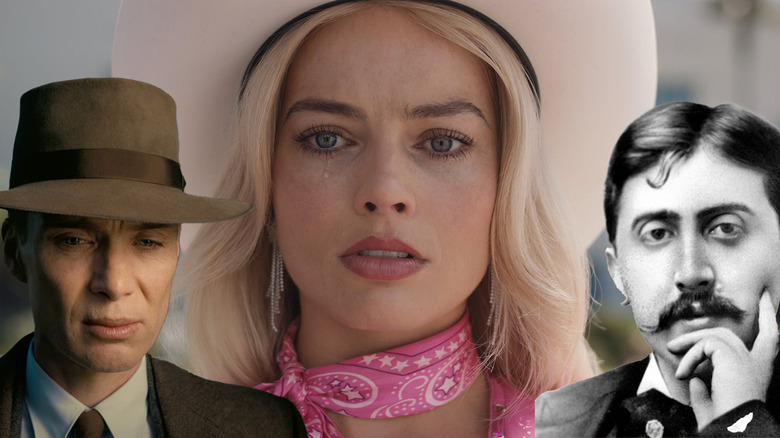Barbie And Oppenheimer Have A Completely Unplanned Connection In Proust Barbie
Once it was announced that Greta Gerwig's "Barbie" and Christopher Nolan's "Oppenheimer" were hitting theaters on the same day, film communities have been experiencing Barbenheimer fever. Hot pink photoshop nightmares featuring Margot Robbie's smiling face in front of mushroom clouds or the horrified face of Cillian Murphy in the plastic environment of Barbieland have been plentiful, and film fans light up with excitement with every weird connective element found between the two films. In what might be the most unexpected connection possible, it turns out that the center of the "Barbie" and "Oppenheimer" Venn diagram is *checks notes* ah, yes, late-19th century French literary figure, Marcel Proust. I promise you, this is not a bit.
Greta Gerwig tossed in a reference to Proust during a moment when the fictional Mattel CEO (Will Ferrell) jokes that the smell of opening up a Barbie box triggers a Proustian memory. He then quips, "Remember Proust Barbie? That did not sell well." The joke is a reference to the concept of involuntary memory, or the way a sensory experience can flood a person with memories associated with that sense. It gets its name from the "Swann's Way" volume of Proust's "À La Recherche Du Temps Perdu" ("In Search of Lost Time"), where a narrator associates a childhood memory with the taste of cake and tea.
During an interview with Associated Press, Gerwig said the reference was intentional. "In 'Remembrance of Things Past,' in 'Swann's Way,' he is literally thrown back into his childhood through the taste of the madeleine," she explained. "I thought, well, that'll be a nice Easter egg for one person." Well, that little Easter egg helped draw a direct line between "Barbie" and "Oppenheimer." Nolan's film is based on the real man, J. Robert Oppenheimer, who was said to have also been a huge fan of Proust.
'The only paradise is paradise lost'
J. Robert Oppenheimer famously struggled with his mental health, having seen three different psychoanalysts in four months during one of his lowest points. However, it was reading Marcel Proust's novel "In Search of Lost Time" and going on a bicycle tour of Corsica that Oppenheimer credited with lifting his depression. Meanwhile, in Barbieland, Lucy Boynton is named as Proust Barbie in the film's credits. Although her scene didn't make the final edit, Gerwig tells a Proustian story of her own within the film, where a doll is introduced to the themes of human struggle.
If we are not our possessions, relationships, or job descriptions, what makes us human? Is it the things we remember? And if so, what does it say about us when the passage of time makes it harder for us to remember those moments? It's an agonizing conundrum to accept as a part of life, but as Proust famously wrote, "The only paradise is a paradise lost."
Lest we forget, there was no way for Gerwig or Nolan to have known their films were going to debut on the same day, so this "Barbie" and "Oppenheimer" Proustian connection is merely coincidental. The Associated Press interview was the first time Gerwig had learned about Oppenheimer's love of Proust, joyfully exclaiming, "So he would have loved Proust Barbie!" Barbie releases lines of Role Model dolls and historical figures every year, so who knows? Maybe when things are all said and done, we'll get a Marcel Proust Ken someday.

